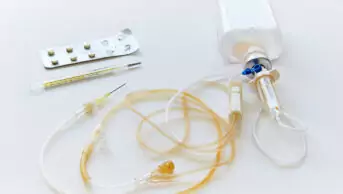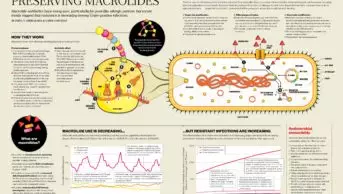
TEK IMAGE/SCIENCE PHOTO LIBRARY
Study results have revealed that nearly half of unnecessary days of antibiotic use occurred following a review of patients’ antibiotic prescriptions that took place no more than 72 hours after initiation.
The study, published in the European Journal of Hospital Pharmacy on 28 April 2023, assessed the appropriateness of antibiotic prescribing in 184 patients, who were discharged from a district general hospital in south west England in August 2020.
In total, the patients were prescribed antibiotics for 1,658 days, of which 403 days were “deemed unnecessary” by two infection specialists, who reviewed each case, the study said.
The researchers from Royal Cornwall Hospitals NHS Trust found that the unnecessary days of antibiotic use occurred at three timepoints: initiation of the antibiotics, at “pre-72 hours review”, and owing to protracted antibiotic courses.
In 2015, the government issued guidance on antimicrobial stewardship for hospital trusts in England, recommending prescribers review “the continuing need for antibiotics at 48–72 hours” and evaluate whether changes should be made to the therapy.
However, the researchers found that, for 42 participants (23%), the antibiotic treatments that continued beyond the pre-72-hours review resulted in 184 days of unnecessary antibiotic use — nearly half (46%) of the 403 unnecessary days of antibiotic use.
“Twenty-nine of 184 (16%) patients’ antibiotics were continued beyond the pre-72 hours review when they could have been stopped entirely, resulting in 140 excess [days of therapy],” the researchers said.
“In the remaining 13 patients (7%), the continuation of antibiotics was deemed appropriate but there were missed opportunities to reduce the number of different antibiotic agents being used, resulting in 44 excess DOTs [days of therapy].”
The study also found that 112 (28%) unnecessary days of therapy originated at the initiation of antibiotics, while 107 (27%) were owing to protracted antibiotic courses.
“The greatest opportunity to reduce antibiotic use safely was the pre-72 hours antibiotic review, which may provide a target for reducing excess antimicrobial therapy in line with the national AMR [antimicrobial resistance] strategy,” the authors wrote.
Neil Powell, consultant antimicrobial pharmacist at Royal Cornwall Hospitals NHS Trust, said: “Antibiotic overuse is said to be common in hospitals but isn’t quantified in English hospitals.
“NHS England has set hospitals targets to reduce antibiotic consumption, but understanding where the antibiotic overuse is is key if hospitals are to set up targeted interventions to reduce excess antibiotic use. We used the UK Health Security Agency (UKHSA) antibiotic audit tool to quantify excess use in our hospital and identified where in the prescribing process the excess antibiotic is.
“This work, coupled with other local studies, has given us some focus for our antibiotic stewardship efforts.”
In November 2022, the UKHSA said that hospitals in England achieved their target to reduce antibiotic prescribing by 15% by 2024 ahead of schedule, after reporting that total antibiotic consumption declined by 15.1% between 2017 and 2021.


